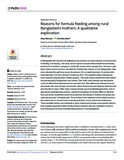| dc.contributor.author | Rahman, Atiya | |
| dc.contributor.author | Akter, Fahmida | |
| dc.date.accessioned | 2022-03-16T08:58:42Z | |
| dc.date.available | 2022-03-16T08:58:42Z | |
| dc.date.copyright | 2019 | |
| dc.date.issued | 2019-02-26 | |
| dc.identifier.citation | Rahman, A., & Akter, F. (2019). Reasons for formula feeding among rural Bangladeshi mothers: A qualitative exploration. PLoS ONE, 14(2) doi:10.1371/journal.pone.0211761 | en_US |
| dc.identifier.uri | http://hdl.handle.net/10361/16467 | |
| dc.description | This article was published in the PLoS ONE [© 2019 Rahman, Akter. This is an open access article distributed under the terms of the Creative Commons Attribution License ] and the definite version is available at: https://doi.org/10.1371/journal.pone.0211761
The Journal's website is at: https://journals.plos.org/plosone/article?id=10.1371/journal.pone.0211761 | en_US |
| dc.description.abstract | In Bangladesh the exclusive breastfeeding rate remains low and prelacteal, formula and bottle feeding is increasing. This study aims to explore reasons behind infant formula feeding practices from mothers, caregivers, and health care provider’s perspective. This was a qualitative study carried out in four sub-districts of Sylhet and Jessore of rural Bangladesh. Data were collected through focus group discussions (12), in-depth interviews (4) and key informant interviews (12) from January to February 2014. The qualitative data collected and were analyzed using thematic content analysis. This study clearly showed the factor behind formula feeding by Bangladeshi rural women. One of the major findings was that women could not differentiate between formula and other milk. Main differences between formula and powder milk were the type of consumer where formula only was taken by infant and children less than 2 years. Other major reasons include; poor breastfeeding practices, lack of appropriate breastfeeding practices, superficial knowledge on harmful effect on infant formula; perceived insufficient breast milk production, the influence of family and society and authoritarian power of hospital staff. Rural mothers have intension to feed infant formula to their infants due to various factors including individual, social, cultural and institutional. These identified factors can contribute to policy making and develop more specific interventions targeting expected mother and their family members that can contribute to stop formula feeding and increase breastfeeding practices in rural Bangladesh. | en_US |
| dc.language.iso | en_US | en_US |
| dc.publisher | PLOS ONE | en_US |
| dc.relation.uri | https://journals.plos.org/plosone/article?id=10.1371/journal.pone.0211761 | |
| dc.subject | Formula feeding | en_US |
| dc.subject | Rural Bangladeshi Mothers | en_US |
| dc.title | Reasons for formula feeding among rural Bangladeshi mothers: A qualitative exploration | en_US |
| dc.type | Journal Article | en_US |
| dc.description.version | Published | |
| dc.contributor.department | Brac James P. Grant School of Public Health | |
| dc.identifier.doi | https://doi.org/10.1371/journal.pone.0211761 | |

